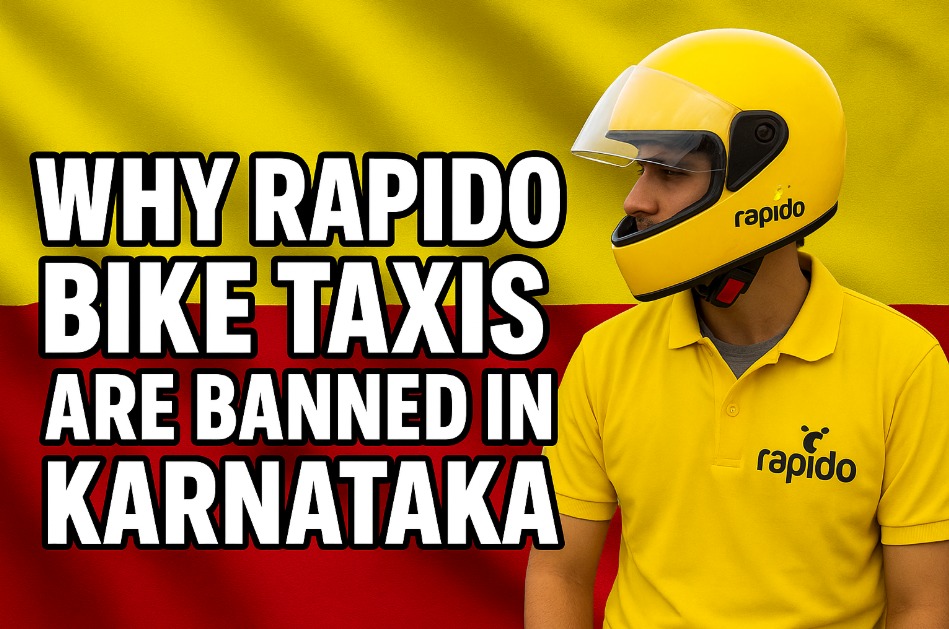What Happened?
If you’ve ever zipped through Bengaluru traffic on a bike taxi, especially using Rapido, here’s some news: the Karnataka government has put the brakes on bike taxis, calling them illegal.
The Karnataka High Court supported the state government’s 2024 decision to ban bike taxi services like Rapido. The court agreed that there were serious concerns about both safety and legality. This decision affects thousands of people—whether you use bike taxis to get around or drive one to earn money.
Why Were Bike Taxis Banned?
No Proper License:
Rapido was using bikes that were registered for private use, not for commercial purposes. This goes against the Motor Vehicles Act. Basically, bikes meant for personal use were being used to carry passengers for money, which is not allowed.
Safety Issues:
The government pointed out that private bikes don’t go through the same safety checks as commercial vehicles. They also don’t have the kind of insurance that protects passengers. So, if there’s an accident, the rider and passenger might not get the medical or legal help they need.
Unfair to Other Drivers:
Auto and taxi drivers protested because they felt it was unfair. They said bike taxis were taking away their customers but didn’t follow the same rules or pay the same taxes. They felt they were losing their income while bike taxi services had an unfair advantage.
What Did the Courts Say?
In February 2024, the Karnataka High Court made it clear: Rapido and similar bike taxi platforms cannot legally operate in the state until the government brings in a clear policy or law to regulate them.
It’s interesting to note that Rapido had previously argued in court that bike taxis are legal in many other states. However, the court responded that since Karnataka has not authorized any such plan, these services will continue to be prohibited until they do.
Effect on Riders and Commuters
Many people’s daily commutes have been hampered by this move, particularly in Bengaluru, where traffic is notorious.
For Commuters: Those who relied on affordable and quick bike rides now have fewer options. Autos and cabs are usually slower and more expensive.
For Riders (Drivers):
Rapido has left thousands of young people, students, and delivery workers in a tough spot, with no clear solution in sight.
Is There a Way Out?
Yes — but only if the state government brings in a proper policy just for bike taxis. This policy should make sure the service is safe, fair, and legal for everyone.
Other states like Delhi, Telangana, and Maharashtra already allow bike taxis under set rules. Karnataka could do the same. But for now, no such rules have been announced.
Things Commuters and Riders Should Know:
Right now, don’t try to book a bike taxi in Karnataka. If you do, traffic police might stop you and fine you.
If riders are caught offering paid bike rides, they could face fines, and their bike might even be taken away.
As of now, people should use other options like regular taxis, buses, the Metro, or autorickshaws.
More Talk: Regulation vs. Innovation
The Rapido ban brings up a bigger question: how should the government handle new and tech-based transport services like bike taxis?
Apps like Rapido solve real urban problems — affordability, last-mile connectivity, job creation. But they also challenge old systems.
The future of such services in Karnataka now depends on whether the government can find a middle path — one that protects commuters, gives legal clarity to startups, and ensures a fair deal for all transport workers.
Summary
- Rapido and similar bike taxis are banned in Karnataka for now.
- The main reasons: legal licensing issues, safety concerns, and lack of a proper regulatory framework.
- The High Court has backed the state’s stance.
- Commuters and riders alike are feeling the heat.
- A policy decision is the need of the hour.
AUTHOR
Pragya Jakhar is a second-year Lovely Professional University student pursuing a B.A. LL.B. (Hons.). Human rights and constitutional law particularly interest her. Pragya likes to write about legal subjects and is committed to improving and making the legal system more accessible to all.
Throughout the years, she has written numerous articles that examine important legal issues, and her growing comprehension of the operation of the law, both in books and in practice, allows her to contribute perceptive opinions to academic and policy discussions. She enjoys keeping up with news and significant court decisions.

